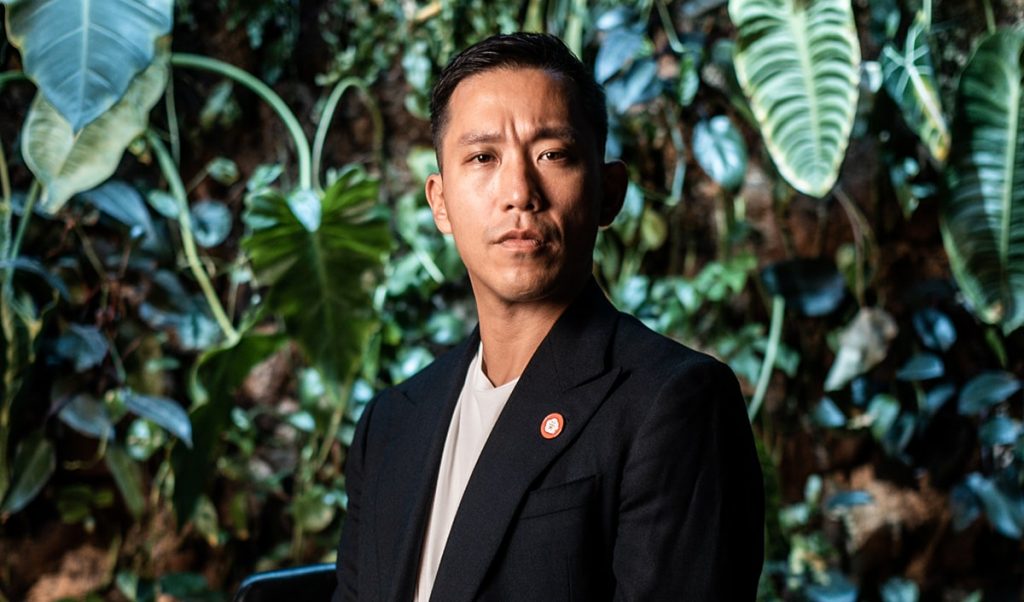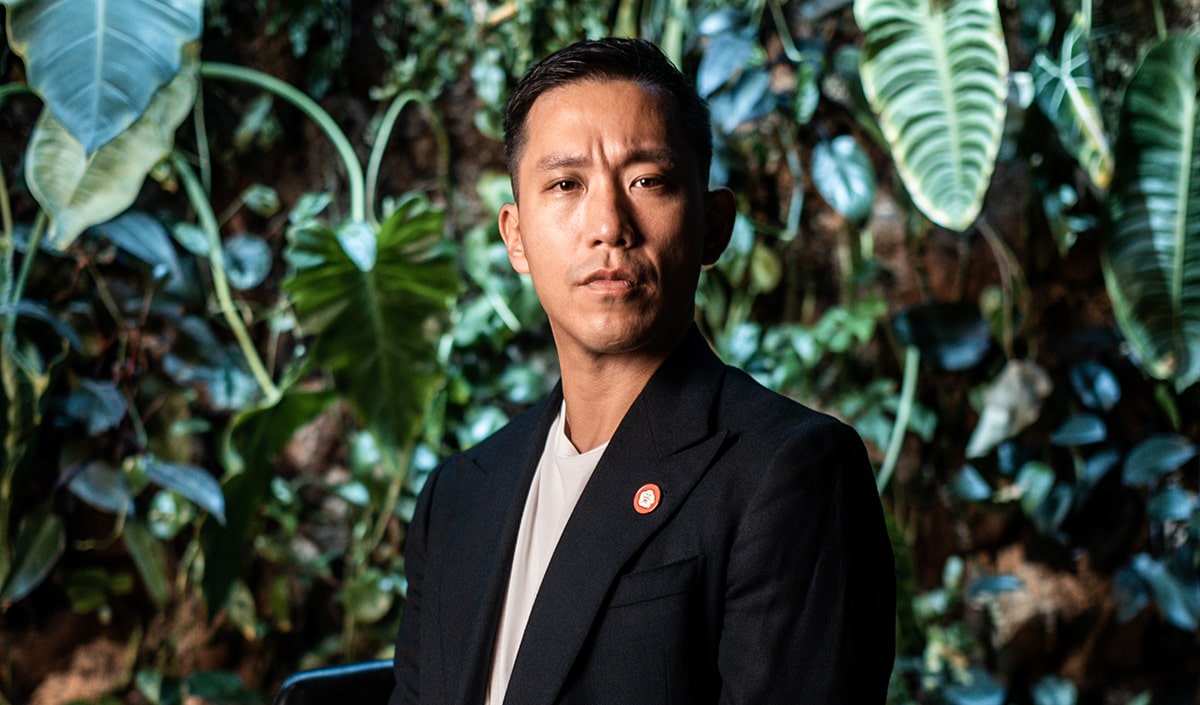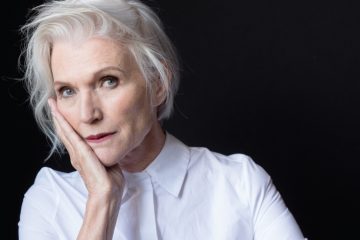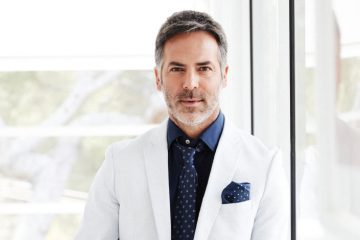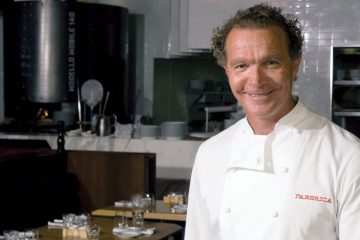Simon Kim: Michelin Star–worthy Restaurants
Restaurateur Simon Kim is bringing fun and fire to the American steakhouse by merging it with Korean barbeque, creating an authentic brand representative of who he is.
Thick slabs of shadowy marble with faint, creamy veins that double as tables; elegant, earthy artwork of obscure, mysterious shapes; and rich, dark-green walls make it clear that Cote is a restaurant that takes itself seriously. But not too seriously — overlooking the dining room is an oversized pink neon sign of Cote’s Korean flower logo, which reassures diners that they’re allowed to have a bit of fun with their dinner. This original combination, rare among Michelin-starred restaurants, only seems paradoxical, though, until you meet Cote’s founder and owner, Simon Kim.
Speaking with Kim makes an impression. He is extremely articulate, with a manner of speaking that is more akin to an old friend than a restaurateur, a characteristic enhanced by the nostalgic, soothing tones of his voice. Grace, integrity and purpose were behind every word he spoke. But just as naturally, Kim made me feel at ease with his lightheartedness; he may be the only Michelin restaurateur to identify “fire, beef and booze” as the secret ingredients to his success.
To understand Kim’s ambitions requires an understanding of the influence of Kim’s parents in shaping the essence of the restaurant. It takes someone with special perseverance and clarity of purpose to bring Korean barbecue to Michelin status. These characteristics can be traced back to Kim’s mother: “My mom, she is one of those ladies, if she puts her mind to it, anything is possible sort of a lady. So, I think I got that entrepreneurial spirit. If I have an intention, if I have a will, there’s going to be a way. And if it doesn’t work out, it means I didn’t try hard enough.” From his father, Kim finds the importance of plate integrity and detail-oriented service. “I am in the hospitality business, and it’s all about the details, and my father is literally the epitome of appreciation of fine details. My father never really appreciated anything because it was highly sought after. There’s going to be someone who actually physically and metaphysically connects with a product, service, restaurant or hospitality institution, and I think that’s my father,” says Kim. “He will go to a restaurant if they have the best product, or where the owner of the restaurant had the best intention and attention to detail, in a very humble but very meaningful, integrity-driven way. He always appreciated that, and I think that impacted me more than anything.”
His father’s influence was what compelled Kim to open his first restaurant in 2013, when he was just 28 years old. “The dinner table is the only time when I had real interaction around my dad; he was very much an introvert. At a very early age, I learned that food has the power to bring people together.” This motivation resulted in Piora, an Italian-Korean restaurant in New York City’s West Village. Although initially a critical success, during its first 18 months, Piora was losing money. Despite pouring his soul into his dream restaurant, Kim was in personal debt and considered closing the restaurant in summer 2014. But Kim, drawing on his parents’ perseverance, held firm in his vision for Piora and kept it open. His dedication paid off. In fall 2014, Piora received a Michelin star. This was a turning point for Kim: “I was able to pay off all my debt; it was a dream come true. We kept the restaurant with the Michelin star for the next four years.”
After the success that came from Piora, it was time to open a new restaurant. In 2017, he closed Piora and opened Cote NYC. In Cote’s inaugural year, it received a Michelin star. Cote’s concept was born out of this realization that Kim had: “The Cote brand is who I am. I am an American. Cote is an American restaurant. We’re the first Korean steakhouse ever. When I came to America, people didn’t see an American, they saw a Korean person. And after being in America, when I went to Korea, people didn’t see me as a Korean, they saw an Americanized version of Korean, and so I kind of didn’t get accepted either here or there,” he says. “And I kind of had an identity crisis and then I realized, after Piora, what makes me unique is that I’m Korean-American. I understand Korean culture better than any Americans can, and I understand American culture better than any Koreans can.”
In February 2021, the avid foodie and restaurateur opened his third restaurant, Cote Miami, after his success with Cote NYC. Cote Miami was two years in the making. It took Kim six months of intense architectural sessions to come up with the initial plan, with construction taking nine months. “We built care into the design, the structures, tables, the flow of the restaurant and, of course, the food procurement. We procure the best ingredients, ingredients with great integrity intact, and the service, too. It’s not just about treating our customer with integrity; it’s the care and anticipating their needs. To me, I think that’s the epitome of hospitality — it’s how much care you can actually output.”
Every detail was taken into account when developing Cote Miami’s concept in order to create the ideal fengshui. Among other things, this meant importing Brazilian stones that were used at the New York location and investing in a half-million dollar, state-of-the-art Paragon Dedicated Outdoor Air System (DOAS), setting a new standard in air quality for indoor dining establishments. Of course, Kim applied the same rigour to developing Cote Miami’s menu. For example, Kim partnered with two of the world’s most prestigious caviar houses, Regiis Ova and Petrossian, for Cote’s caviar service, one of Kim’s favourite items on the menu. Details like these are what make Kim’s execution stand out from the rest.
The launch of his new restaurant and operating Cote NYC during the pandemic were described by Kim as “the single greatest challenge that he had faced in his entire life.” But again, this is where his parents’ lessons of perseverance are invaluable.
During the pandemic, the savvy businessman quickly pivoted and found a “way” to deliver to his customers by providing “steak care packages,” and he partnered with Goldbelly, a national food delivery platform, to ship steak to places as far as Hawaii. Cote even partnered with Frontline Foods, providing meals for front-line workers, as well as City Harvest, donating five per cent of his sales to the organization.
To add to his philanthropic work, Kim has been hosting fundraisers for organizations fighting against the recent increase of violence against Asian Americans, namely Apex For Youth, CACF NYC and AAFE NYC, raising a total of US$23,500.
“The Cote Brand Is Who I Am. I Am An American. Cote Is An American Restaurant. We’re The First Korean Steakhouse Ever”
He plans on expanding the Cote brand further and shares an optimistic approach for the hospitality industry as a whole: “I think the restaurant industry and hospitality are in position for the greatest decade we’ve ever seen.”
While climbing up the hospitality ladder in his twenties, Kim met one of his biggest mentors, Yong-Maan Park. As a former chairman of the Chamber of Commerce in Korea and former chairman of Doosan Corporation, Korea’s oldest conglomerate, Park became an important figure in Kim’s life, both personally and professionally. “I met him while I was a manager at Jean-Georges restaurant. He would come to New York once a month, and I booked amazing restaurants for him. He appreciated my access to good restaurants, and I appreciated his ability to pay for the bills. Over the years, we became really good friends. We would dine, talk about business, growth and dreams — all those things — and he became kind of like my father figure.”
Some of the greatest advice has come from the conversations over dinner with Park. While Kim was in the middle of opening Cote NYC and closing Piora, he was concerned about having children and the pressures that he was facing in business at the time. Park assured Kim that everything would be OK: “‘Your child has his own fate, so I understand, as a parent, you may feel like you have to do everything,’ he said. ‘Don’t overthink it; you’re not God. Just don’t get in the way.’”
In a way, the three-time Michelin star restaurateur’s success was almost preordained, starting from his family’s dinner table in Seoul. At dinner, Kim saw his mother’s keen desire to please her husband through her cooking. Her meals were respectfully critiqued by Kim’s father in the way a Michelin inspector inspects a star chef. This left an imprint on Kim’s future restaurants, as he always thought to himself: How can I please my father? What would my father say about this — about this plate or about this chair?
Kim made me rethink the deep impact that hospitality can have on someone. For him, it’s the little things that hospitality can offer that impress him, like turndown service in the evening, or the water placed on the bedside table in case one becomes thirsty in the evening. “Those are the details that wow me, because I didn’t know that I needed them, and, to me, that’s motherly. And that’s why moms are the best, right? And when you become old and you no longer have Mom, being able to feel that motherly care through hospitality is everything to me.”
It should be no surprise, then, to learn what Kim hopes to have as his last meal: “A dinner that my mother cooked for me.”











































































